- Learning time
- 20 minutes
- First play time
- 60 minutes
Akrotiri
Designed by: Jay Cormier,Sen-Foong Lim
Akrotiri is a two-player game of trade and temples played across a watery landscape of the Aegean – with a series of islands.
The board is an ever-expanding map of tiles – on your turn you add another tile and place resources on it – one of the colour the icon on the tile demands, and another of your choice: there are four to choose from. Once you’ve added a tile, you can take three actions – moving your boat, loading your boat, excavating a temple (more on that in a moment) or, as long as you’re located at the biggest island of Thera, you may sell goods (selling is a free action), you may consult the oracle, or buy maps.
Selling goods gets you cash, which means you can buy maps and excavate temples. Buying maps allows you to excavate temples, and consulting the oracle helps speed the process along. Each map shows where a temple may be ‘found’ (- in terms of theme, you’re excavating, but mechanically it’s easier to think of it as building a temple, as there is some flexibility in the finding!). Rather than a specific location, the map specifies that a temple may be excavated in a place with tile icons north, south, east or west of it. For instance, a map might say you can excavate a temple where there are two green icons north of it, one red south, and one blue west. The green icons can also be east or west of the location, as long as they are also north: ie, they don’t have to be due north. As excavating temples is a key part of winning the game, the tiles you lay and where you lay them take on real significance, because they define where temples can be excavated.
Bear in mind too that each island on the board can only have one Temple!
So when you Consult the oracle, instead of picking up your next tile randomly, you can look through the deck for one you need to get a Temple excavated. Excavating a temple has both an end-game bonus (points) and an immediate one, as each temple excavated triggers either an extra action on future turns, or a Goal Card.
Goal Cards are simply a way of scoring more points at the end of the game, if you meet their requirements. They might score you points if you excavated Temples on islands with red icons, for instance, or points for Temples on islands with no terrain icons on them at all. When either player excavates their seventh Temple, the end of the game is triggered.
The guru's verdict
-
Take That!
Take That!
There's a seam of screwage running through Akrotiri - it's kind of a race, and you may find not only does someone occupy an island with a Temple before you can, but they sell the goods you're picking up, thus devaluing them at the market.
-
Fidget Factor!
Fidget Factor!
Pretty slim. You're only waiting for one opponent to take their turn.
-
Brain Burn!
Brain Burn!
At first glance it looks like trading is the centre of the game - after all, you're moving a boat around, collecting and delivering goods. But really, that's just so you can afford the maps that let you excavate the Temples - ending the game cash-rich and Temple-poor will mean defeat. So the brain-burning here is just about getting your head around how the maps work, and where your Temples can be found.
-
Again Again!
Again Again!
Tiles, maps, and Goal Cards all come out randomly by default, and the tiles can fit together in almost infinitely different ways. You can vary strategy too - go for the (comparatively) easy-to-place Temples that score less points, or the trickier ones?

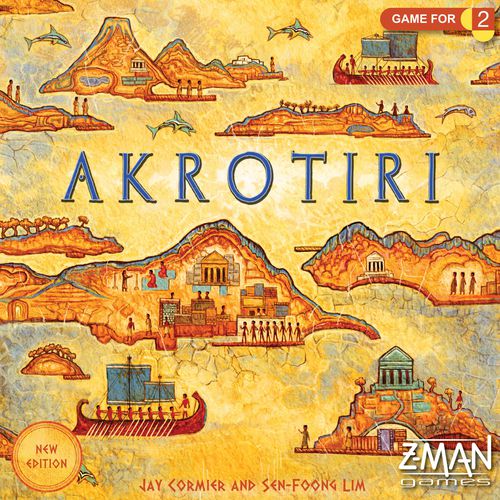
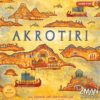
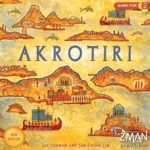
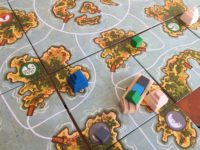
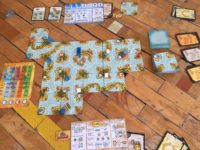


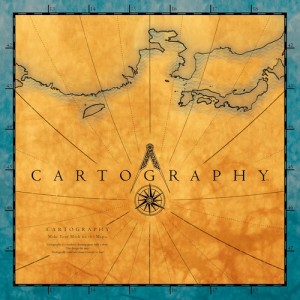
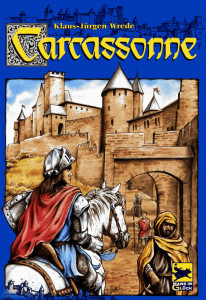


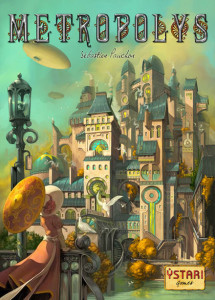
Sam says
Two-player games aren't something I play a huge amount of, and Akrotiri's box art didn't grab me either. But the game is neat - combining the very simple mechanisms of your boat - loading, travelling, delivering - facilitating the slightly trickier Temple-excavation. The way the maps work is hard to describe in the text above, but after one play it becomes much clearer and, because players can't see each others maps or goal cards, there's a sense of tension over who will score the most at the end of the game. Plus there's something about the expanding landscape growing across the table-top that's very satisfying too. It is an abstract game really, but a satisfying one.